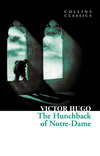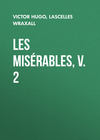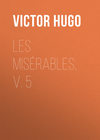Loe raamatut: «The Man Who Laughs», lehekülg 23
CHAPTER IX.
ABSURDITIES WHICH FOLKS WITHOUT TASTE CALL POETRY
The pieces written by Ursus were interludes – a kind of composition out of fashion nowadays. One of these pieces, which has not come down to us, was entitled "Ursus Rursus." It is probable that he played the principal part himself. A pretended exit, followed by a reappearance, was apparently its praiseworthy and sober subject. The titles of the interludes of Ursus were sometimes Latin, as we have seen, and the poetry frequently Spanish. The Spanish verses written by Ursus were rhymed, as was nearly all the Castilian poetry of that period. This did not puzzle the people. Spanish was then a familiar language; and the English sailors spoke Castilian even as the Roman sailors spoke Carthaginian (see Plautus). Moreover, at a theatrical representation, as at mass, Latin, or any other language unknown to the audience, is by no means a subject of care with them. They get out of the dilemma by adapting to the sounds familiar words. Our old Gallic France was particularly prone to this manner of being devout. At church, under cover of an Immolatus, the faithful chanted, "I will make merry;" and under a Sanctus, "Kiss me, sweet."
The Council of Trent was required to put an end to these familiarities.
Ursus had composed expressly for Gwynplaine an interlude, with which he was well pleased. It was his best work. He had thrown his whole soul into it. To give the sum of all one's talents in the production is the greatest triumph that any one can achieve. The toad which produces a toad achieves a grand success. You doubt it? Try, then, to do as much.
Ursus had carefully polished this interlude. This bear's cub was entitled "Chaos Vanquished." Here it was: – A night scene. When the curtain drew up, the crowd, massed around the Green Box, saw nothing but blackness. In this blackness three confused forms moved in the reptile state – wolf, a bear, and a man. The wolf acted the wolf; Ursus, the bear; Gwynplaine, the man. The wolf and the bear represented the ferocious forces of Nature – unreasoning hunger and savage ignorance. Both rushed on Gwynplaine. It was chaos combating man. No face could be distinguished. Gwynplaine fought infolded, in a winding-sheet, and his face was covered by his thickly-falling locks. All else was shadow. The bear growled, the wolf gnashed his teeth, the man cried out. The man was down; the beasts overwhelmed him. He cried for aid and succour; he hurled to the unknown an agonized appeal. He gave a death-rattle. To witness this agony of the prostrate man, now scarcely distinguishable from the brutes, was appalling. The crowd looked on breathless; in one minute more the wild beasts would triumph, and chaos reabsorb man. A struggle – cries – howlings; then, all at once, silence.
A song in the shadows. A breath had passed, and they heard a voice. Mysterious music floated, accompanying this chant of the invisible; and suddenly, none knowing whence or how, a white apparition arose. This apparition was a light; this light was a woman; this woman was a spirit. Dea – calm, fair, beautiful, formidable in her serenity and sweetness – appeared in the centre of a luminous mist. A profile of brightness in a dawn! She was a voice – a voice light, deep, indescribable. She sang in the new-born light – she, invisible, made visible. They thought that they heard the hymn of an angel or the song of a bird. At this apparition the man, starting up in his ecstasy, struck the beasts with his fists, and overthrew them.
Then the vision, gliding along in a manner difficult to understand, and therefore the more admired, sang these words in Spanish sufficiently pure for the English sailors who were present: —
Then looking down, as if she saw a gulf beneath, she went on, —
As she sang, the man raised himself by degrees; instead of lying he was now kneeling, his hands elevated towards the vision, his knees resting on the beasts, which lay motionless, and as if thunder-stricken.
She continued, turning towards him, —
And approaching him with the majesty of a star, she added, —
And she put hot hand on his brow. Then another voice arose, deeper, and consequently still sweeter – a voice broken and enwrapt with a gravity both tender and wild. It was the human chant responding to the chant of the stars. Gwynplaine, still in obscurity, his head under Dea's hand, and kneeling on the vanquished bear and wolf, sang, —
And suddenly from the shadow a ray of light fell full upon Gwynplaine. Then, through the darkness, was the monster full exposed.
To describe the commotion of the crowd is impossible.
A sun of laughter rising, such was the effect. Laughter springs from unexpected causes, and nothing could be more unexpected than this termination. Never was sensation comparable to that produced by the ray of light striking on that mask, at once ludicrous and terrible. They laughed all around his laugh. Everywhere – above, below, behind, before, at the uttermost distance; men, women, old gray-heads, rosy-faced children; the good, the wicked, the gay, the sad, everybody. And even in the streets, the passers-by who could see nothing, hearing the laughter, laughed also. The laughter ended in clapping of hands and stamping of feet. The curtain dropped: Gwynplaine was recalled with frenzy. Hence an immense success. Have you seen "Chaos Vanquished?" Gwynplaine was run after. The listless came to laugh, the melancholy came to laugh, evil consciences came to laugh – a laugh so irresistible that it seemed almost an epidemic. But there is a pestilence from which men do not fly, and that is the contagion of joy. The success, it must be admitted, did not rise higher than the populace. A great crowd means a crowd of nobodies. "Chaos Vanquished" could be seen for a penny. Fashionable people never go where the price of admission is a penny.
Ursus thought a good deal of his work, which he had brooded over for a long time. "It is in the style of one Shakespeare," he said modestly.
The juxtaposition of Dea added to the indescribable effect produced by Gwynplaine. Her white face by the side of the gnome represented what might have been called divine astonishment. The audience regarded Dea with a sort of mysterious anxiety. She had in her aspect the dignity of a virgin and of a priestess, not knowing man and knowing God. They saw that she was blind, and felt that she could see. She seemed to stand on the threshold of the supernatural. The light that beamed on her seemed half earthly and half heavenly. She had come to work on earth, and to work as heaven works, in the radiance of morning. Finding a hydra, she formed a soul. She seemed like a creative power, satisfied but astonished at the result of her creation; and the audience fancied that they could see in the divine surprise of that face desire of the cause and wonder at the result. They felt that she loved this monster. Did she know that he was one? Yes; since she touched him. No; since she accepted him. This depth of night and this glory of day united, formed in the mind of the spectator a chiaroscuro in which appeared endless perspectives. How much divinity exists in the germ, in what manner the penetration of the soul into matter is accomplished, how the solar ray is an umbilical cord, how the disfigured is transfigured, how the deformed becomes heavenly – all these glimpses of mysteries added an almost cosmical emotion to the convulsive hilarity produced by Gwynplaine. Without going too deep – for spectators do not like the fatigue of seeking below the surface – something more was understood than was perceived. And this strange spectacle had the transparency of an avatar.
As to Dea, what she felt cannot be expressed by human words. She knew that she was in the midst of a crowd, and knew not what a crowd was. She heard a murmur, that was all. For her the crowd was but a breath. Generations are passing breaths. Man respires, aspires, and expires. In that crowd Dea felt herself alone, and shuddering as one hanging over a precipice. Suddenly, in this trouble of innocence in distress, prompt to accuse the unknown, in her dread of a possible fall, Dea, serene notwithstanding, and superior to the vague agonies of peril, but inwardly shuddering at her isolation, found confidence and support. She had seized her thread of safety in the universe of shadows; she put her hand on the powerful head of Gwynplaine.
Joy unspeakable! she placed her rosy fingers on his forest of crisp hair. Wool when touched gives an impression of softness. Dea touched a lamb which she knew to be a lion. Her whole heart poured out an ineffable love. She felt out of danger – she had found her saviour. The public believed that they saw the contrary. To the spectators the being loved was Gwynplaine, and the saviour was Dea. What matters? thought Ursus, to whom the heart of Dea was visible. And Dea, reassured, consoled and delighted, adored the angel whilst the people contemplated the monster, and endured, fascinated herself as well, though in the opposite sense, that dread Promethean laugh.
True love is never weary. Being all soul it cannot cool. A brazier comes to be full of cinders; not so a star. Her exquisite impressions were renewed every evening for Dea, and she was ready to weep with tenderness whilst the audience was in convulsions of laughter. Those around her were but joyful; she was happy.
The sensation of gaiety due to the sudden shock caused by the rictus of Gwynplaine was evidently not intended by Ursus. He would have preferred more smiles and less laughter, and more of a literary triumph. But success consoles. He reconciled himself every evening to his excessive triumph, as he counted how many shillings the piles of farthings made, and how many pounds the piles of shillings; and besides, he said, after all, when the laugh had passed, "Chaos Vanquished" would be found in the depths of their minds, and something of it would remain there.
Perhaps he was not altogether wrong: the foundations of a work settle down in the mind of the public. The truth is, that the populace, attentive to the wolf, the bear, to the man, then to the music, to the howlings governed by harmony, to the night dissipated by dawn, to the chant releasing the light, accepted with a confused, dull sympathy, and with a certain emotional respect, the dramatic poem of "Chaos Vanquished," the victory of spirit over matter, ending with the joy of man.
Such were the vulgar pleasures of the people.
They sufficed them. The people had not the means of going to the noble matches of the gentry, and could not, like lords and gentlemen, bet a thousand guineas on Helmsgail against Phelem-ghe-madone.
CHAPTER X.
AN OUTSIDER'S VIEW OF MEN AND THINGS
Man has a notion of revenging himself on that which pleases him. Hence the contempt felt for the comedian.
This being charms me, diverts, distracts, teaches, enchants, consoles me; flings me into an ideal world, is agreeable and useful to me. What evil can I do him in return? Humiliate him. Disdain is a blow from afar. Let us strike the blow. He pleases me, therefore he is vile. He serves me, therefore I hate him. Where can I find a stone to throw at him? Priest, give me yours. Philosopher, give me yours. Bossuet, excommunicate him. Rousseau, insult him. Orator, spit the pebbles from your mouth at him. Bear, fling your stone. Let us cast stones at the tree, hit the fruit and eat it. "Bravo!" and "Down with him!" To repeat poetry is to be infected with the plague. Wretched playactor, we will put him in the pillory for his success. Let him follow up his triumph with our hisses. Let him collect a crowd and create a solitude. Thus it is that the wealthy, termed the higher classes, have invented for the actor that form of isolation, applause.
The crowd is less brutal. They neither hated nor despised Gwynplaine. Only the meanest calker of the meanest crew of the meanest merchantman, anchored in the meanest English seaport, considered himself immeasurably superior to this amuser of the "scum," and believed that a calker is as superior to an actor as a lord is to a calker.
Gwynplaine was, therefore, like all comedians, applauded and kept at a distance. Truly, all success in this world is a crime, and must be expiated. He who obtains the medal has to take its reverse side as well.
For Gwynplaine there was no reverse. In this sense, both sides of his medal pleased him. He was satisfied with the applause, and content with the isolation. In applause he was rich, in isolation happy.
To be rich in his low estate means to be no longer wretchedly poor – to have neither holes in his clothes, nor cold at his hearth, nor emptiness in his stomach. It is to eat when hungry and drink when thirsty. It is to have everything necessary, including a penny for a beggar. This indigent wealth, enough for liberty, was possessed by Gwynplaine. So far as his soul was concerned, he was opulent. He had love. What more could he want? Nothing.
You may think that had the offer been made to him to remove his deformity he would have grasped at it. Yet he would have refused it emphatically. What! to throw off his mask and have his former face restored; to be the creature he had perchance been created, handsome and charming? No, he would never have consented to it. For what would he have to support Dea? What would have become of that poor child, the sweet blind girl who loved him? Without his rictus, which made him a clown without parallel, he would have been a mountebank, like any other; a common athlete, a picker up of pence from the chinks in the pavement, and Dea would perhaps not have had bread every day. It was with deep and tender pride that he felt himself the protector of the helpless and heavenly creature. Night, solitude, nakedness, weakness, ignorance, hunger, and thirst – seven yawning jaws of misery – were raised around her, and he was the St. George fighting the dragon. He triumphed over poverty. How? By his deformity. By his deformity he was useful, helpful, victorious, great. He had but to show himself, and money poured in. He was a master of crowds, the sovereign of the mob. He could do everything for Dea. Her wants he foresaw; her desires, her tastes, her fancies, in the limited sphere in which wishes are possible to the blind, he fulfilled. Gwynplaine and Dea were, as we have already shown, Providence to each other. He felt himself raised on her wings; she felt herself carried in his arms. To protect the being who loves you, to give what she requires to her who shines on you as your star, can anything be sweeter? Gwynplaine possessed this supreme happiness, and he owed it to his deformity. His deformity had raised him above all. By it he had gained the means of life for himself and others; by it he had gained independence, liberty, celebrity, internal satisfaction and pride. In his deformity he was inaccessible. The Fates could do nothing beyond this blow in which they had spent their whole force, and which he had turned into a triumph. This lowest depth of misfortune had become the summit of Elysium. Gwynplaine was imprisoned in his deformity, but with Dea. And this was, as we have already said, to live in a dungeon of paradise. A wall stood between them and the living world. So much the better. This wall protected as well as enclosed them. What could affect Dea, what could affect Gwynplaine, with such a fortress around them? To take from him his success was impossible. They would have had to deprive him of his face. Take from him his love. Impossible. Dea could not see him. The blindness of Dea was divinely incurable. What harm did his deformity do Gwynplaine? None. What advantage did it give him? Every advantage. He was beloved, notwithstanding its horror, and perhaps for that very cause. Infirmity and deformity had by instinct been drawn towards and coupled with each other. To be beloved, is not that everything? Gwynplaine thought of his disfigurement only with gratitude. He was blessed in the stigma. With joy he felt that it was irremediable and eternal. What a blessing that it was so! While there were highways and fairgrounds, and journeys to take, the people below and the sky above, they would be sure to live, Dea would want nothing, and they should have love. Gwynplaine would not have changed faces with Apollo. To be a monster was his form of happiness.
Thus, as we said before, destiny had given him all, even to overflowing. He who had been rejected had been preferred.
He was so happy that he felt compassion for the men around him. He pitied the rest of the world. It was, besides, his instinct to look about him, because no one is always consistent, and a man's nature is not always theoretic; he was delighted to live within an enclosure, but from time to time he lifted his head above the wall. Then he retreated again with more joy into his loneliness with Dea, having drawn his comparisons. What did he see around him?
What were those living creatures of which his wandering life showed him so many specimens, changed every day? Always new crowds, always the same multitude, ever new faces, ever the same miseries. A jumble of ruins. Every evening every phase of social misfortune came and encircled his happiness.
The Green Box was popular.
Low prices attract the low classes. Those who came were the weak, the poor, the little. They rushed to Gwynplaine as they rushed to gin. They came to buy a pennyworth of forgetfulness. From the height of his platform Gwynplaine passed those wretched people in review. His spirit was enwrapt in the contemplation of every succeeding apparition of widespread misery. The physiognomy of man is modelled by conscience, and by the tenor of life, and is the result of a crowd of mysterious excavations. There was never a suffering, not an anger, not a shame, not a despair, of which Gwynplaine did not see the wrinkle. The mouths of those children had not eaten. That man was a father, that woman a mother, and behind them their families might be guessed to be on the road to ruin. There was a face already marked by vice, on the threshold of crime, and the reasons were plain – ignorance and indigence. Another showed the stamp of original goodness, obliterated by social pressure, and turned to hate. On the face of an old woman he saw starvation; on that of a girl, prostitution. The same fact, and although the girl had the resource of her youth, all the sadder for that! In the crowd were arms without tools; the workers asked only for work, but the work was wanting. Sometimes a soldier came and seated himself by the workmen, sometimes a wounded pensioner; and Gwynplaine saw the spectre of war. Here Gwynplaine read want of work; there man-farming, slavery. On certain brows he saw an indescribable ebbing back towards animalism, and that slow return of man to beast, produced on those below by the dull pressure of the happiness of those above. There was a break in the gloom for Gwynplaine. He and Dea had a loophole of happiness; the rest was damnation. Gwynplaine felt above him the thoughtless trampling of the powerful, the rich, the magnificent, the great, the elect of chance. Below he saw the pale faces of the disinherited. He saw himself and Dea, with their little happiness, so great to themselves, between two worlds. That which was above went and came, free, joyous, dancing, trampling under foot; above him the world which treads, below the world which is trodden upon. It is a fatal fact, and one indicating a profound social evil, that light should crush the shadow! Gwynplaine thoroughly grasped this dark evil. What! a destiny so reptile? Shall a man drag himself thus along with such adherence to dust and corruption, with such vicious tastes, such an abdication of right, or such abjectness that one feels inclined to crush him under foot? Of what butterfly is, then, this earthly life the grub?
What! in the crowd which hungers and which denies everywhere, and before all, the questions of crime and shame (the inflexibility of the law producing laxity of conscience), is there no child that grows but to be stunted, no virgin but matures for sin, no rose that blooms but for the slime of the snail?
His eyes at times sought everywhere, with the curiosity of emotion, to probe the depths of that darkness, in which there died away so many useless efforts, and in which there struggled so much weariness: families devoured by society, morals tortured by the laws, wounds gangrened by penalties, poverty gnawed by taxes, wrecked intelligence swallowed up by ignorance, rafts in distress alive with the famished, feuds, dearth, death-rattles, cries, disappearances. He felt the vague oppression of a keen, universal suffering. He saw the vision of the foaming wave of misery dashing over the crowd of humanity. He was safe in port himself, as he watched the wreck around him. Sometimes he laid his disfigured head in his hands and dreamed.
What folly to be happy! How one dreams! Ideas were born within him. Absurd notions crossed his brain.
Because formerly he had succoured an infant, he felt a ridiculous desire to succour the whole world. The mists of reverie sometimes obscured his individuality, and he lost his ideas of proportion so far as to ask himself the question, "What can be done for the poor?" Sometimes he was so absorbed in his subject as to express it aloud. Then Ursus shrugged his shoulders and looked at him fixedly. Gwynplaine continued his reverie.
"Oh; were I powerful, would I not aid the wretched? But what am I? An atom. What can I do? Nothing."
He was mistaken. He was able to do a great deal for the wretched. He could make them laugh; and, as we have said, to make people laugh is to make them forget. What a benefactor on earth is he who can bestow forgetfulness!




















